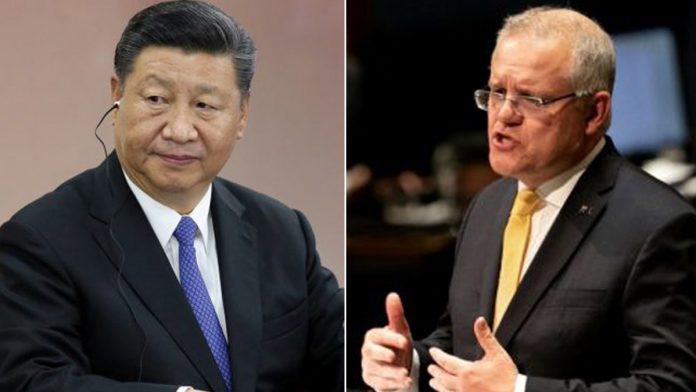The Sino-Australia competition for influence in the Pacific has heightened yet again. Australian PM Scott Morrison understands how a Communist China wants to leave its authoritarian impression upon the region. In fact, Morrison has been looking to kick China out of the region. And now, Beijing is responding with its own plans to shore up its presence in the region.
China is making a fresh push to threaten Australia’s regional interest and influence in the Pacific Islands region. Beijing has reportedly drawn up plans to upgrade an airstrip and bridge on one of Kiribati’s strategically located islands, just about 3,000 km southwest of Hawaii. The same site hosted military aircraft during World War II and now China wants to revive the airstrip. But Canberra which considers the region as its exclusive sphere of influence won’t let it happen.
The details of China’s planned project have not yet been made clear, though it will reportedly involve construction on Kiribati’s Kanton island, located midway between Asia and the Americas. Also, the Chinese project will be positioned across major sea lanes between North America, and Australia and New Zealand.
Any Chinese military build-up on the island will give the paper dragon deep access into territory that was totally aligned to the US and Australia till now. It will also let China come really close to American military bases in the Pacific Islands.
Along with its strategic position, the Kanton island also carries natural resource wealth in the form of rich fisheries, including tuna. Commercial fishing is prohibited as the island is situated in a marine protection zone, but China seldom pays by the book.
The growing Chinese influence in Kiribati is a consequence of the 2020 elections in the island nation, during which pro-China President leader Taneti Maamau got re-elected. Earlier, in 2019, Maamau oversaw Kiribati’s decisions to sever diplomatic ties with the island nation of Taiwan and recognise the People’s Republic of China instead.
Yet, the Maamau administration is facing opposition for letting China militarise a remote Kiribati island. Opposition lawmaker Tessie Lambourne told Reuters that she was concerned about the project and that she wanted to know if it was a part of the Belt and Road Initiative.
Lambourne said, “The government hasn’t shared the cost and other details other than it’s a feasibility study for the rehabilitation of the runway and bridge.” The lawmaker added, “The opposition will be seeking more information from government in due course.”
Meanwhile, the office of Kiribati President and the Chinese Foreign Ministry have not responded to Reuters’ questions.
Yet, the Morrison government won’t let the project sail through easily. Till now, Canberra has managed to kick China out of Southern Pacific region every single time. Australian Defence Ministry is presently reviewing the 2015 Darwin port agreement between Northern Territory’s then-Country Liberal party (CLP) government and China’s Landbridge Group. The agreement had given the Darwin port to the Chinese company on a 99-year lease.
Last year, Australia managed to drive a deep wedge between China and Papua New Guinea, which ultimately led to Beijing getting kicked out of the Pacific country.
As for Kiribati, it is true that there is a pro-Beijing dispensation in power in the island country. But it is not as if Canberra has lost all its influence. Kiribati still gets a major share of its development assistance and economic aid from Canberra. In 2020-21, Australian Official Development Assistance (ODA) to Kiribati stood as high as $30.5 million. Australia has been helping Kiribati in the health sector, education, employment-oriented skill development and post-pandemic economic recovery. On the other hand, all that China can offer is debt traps and predatory loans. In case, things really go down to the wire, Morrison will ask Kiribati to make a choice between China and Australia.
When Kiribati was turning extremely pro-China in 2019, Australia and China hadn’t really become regional rivals. But today, the Sino-Australia rivalry has reached the stage of adversarial competition. It is unlikely that Morrison would gloss over China’s attempts to militarise a Pacific Island country.
